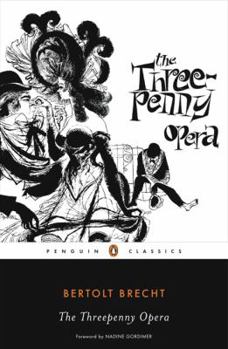Book Overview
Brutal, scandalous, perverted, yet humorous, hummable, and with a happy ending- Bertolt Brecht's revolutionary masterpiece The Threepenny Opera is a landmark of modern drama that has become embedded in the Western cultural imagination. Through the love story of Polly Peachum and "Mack the Knife" Macheath, the play satirizes the bourgeois of the Weimar Republic, revealing a society at the height of decadence and on the verge of chaos. Complemented...
Format:Paperback
Language:English
ISBN:0143105167
ISBN13:9780143105169
Release Date:December 2007
Publisher:Penguin Group
Length:129 Pages
Weight:0.35 lbs.
Dimensions:0.5" x 6.5" x 7.8"
Age Range:18 years and up
Grade Range:Postsecondary and higher
Customer Reviews
4 ratings
On The Threepenny Opera
Published by Thriftbooks.com User , 15 years ago
Bawdy, facetious, and unapologetically bleeding hearted, The Threepenny Opera is Bertolt Brecht's most playful and accessible critique of Western society.
The Truest transaltion
Published by Thriftbooks.com User , 16 years ago
It is also the best, gutteral and earthy, this transaltion had audiences and critics cheering in 1977. So why is the recording re-release on CD being blocked by the Weill Estate?
IN THE MATTER OF ONE MAC THE KNIFE
Published by Thriftbooks.com User , 17 years ago
I have reviewed some of the Communist master playwright Bertolt Brecht's later more consciously political and didactic plays elsewhere in this space. The play under review is an earlier work, before he fully committed himself to communism, and is an adaptation of John Gay's 18th century Beggar's Opera to the modern theater. The subject at hand is a look at the way those in the lower depths of society survive under emergent capitalist conditions, especially the main character, one MacHealth a.k.a. Mac the Knife. As such Brecht's adaptation has given no end of problems for those critics who want to claim it for the communist cause. It is far too universal in it sentiment about human nature in the capitalist era and therefore properly is a transitional to his later more consciously partisan works like The Measures Taken and The Mother. Thus one should take it for is own worth as a look at survival in a seemingly Hobbesian world. The plot line is rather simply-MacHealth, a former British imperial soldier, has struck out on his own in dog-eat dog London and has created a name for himself as a master criminal and seducer of the ladies. Other forces including the constabulary, a small disreputable but conniving businessman and, let us be politically correct here, some sexual workers combine in an attempt to deprive Mac of life and limb. However luck and a royal coronation combine to thwart those best laid plans. All of this is performed in a light operatic format that allows Brecht to wax poetic at humanity's plight through a series of sharply-etched songs in which he collaborated with the legendary Kurt Weill. Above I referred to some controversy about Brecht's intention in this work. That the roguish, incipient capitalist MacHealth is saved in the end through royal intervention has caused some commentators to argue for the organic connection between the rising capitalist class and the monarchy in England. Others have noted the similarities in appetite between the lumpenproletariat element as represented by MacHealth and his criminal crew and the developing capitalism of the time. I think that both views overdraw what one can take out of Gay's story or Brecht's adaptation. This story line is much more conducive to a generalized treatment on the nature of survival in a world that has broken from its agrarian past and has not yet stabilized it bourgeois norms of propriety. Some of these same characteristics were played out in the development of American capitalism, especially in the Wild West. But as presented here this is only a rudimentary outline of where things could go. I stand by my comment in the first paragraph about the unmediated nature of Brecht's take on Gay's little work. He most definitely got more focused on the nature of the human plight under capitalism latter as he developed as a Marxist.
Probably the best translation to capture Brecht's intentions
Published by Thriftbooks.com User , 26 years ago
Of all the translations on the market, this one is the best -- most are watered-down, tepid versions. Manheim & Willet's was used in the late 1970's revival of the piece by the New York Shakespeare Festival, which starred the late Raul Julia and Ellen Greene (of "Little Shop of Horrors" fame, in the role originally intended for Lotte Lenya).





